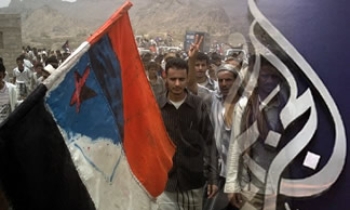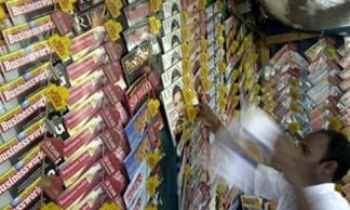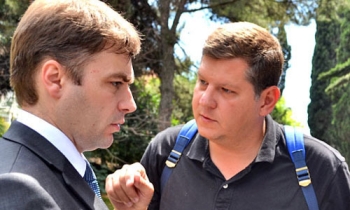The U.S. Agency for International Development (USAID) Iraq Civil Society and Independent Media Program (ICSP) works to strengthen Iraq's emerging commercial and public service media, emphasizing professional news and public affairs reporting to better inform and engage the Iraqi public in the democratic process.
The ICSP program provides varied and ongoing support for developing media outlets at both the national and local levels. With ICSP assistance, Iraqi journalists have the chance to build journalism skills, learn media management techniques, and advocate for a legal and regulatory system conducive to free speech and independent, responsible media.
In Kurdistan, where most of the media remains government affiliated, the creation of a second independent newspaper is another step toward democratization. In addition to providing unbiased, accurate reporting, Awene aspires to be the first independent media corporation in the region. ICSP is helping the Sulymaniyah-based Awene achieve its goals by supporting the paper's growth and staff development.
Independent media institutions in Kurdistan that are not funded by one of the two main political parties or Baghdad are relatively new phenomena. Awene's largest competitor, Hawlati, was the first independent newspaper in the region. Formed in 2000 using the regional autonomy that was granted following the Gulf War, the paper took full advantage of the freedom of speech that was previously unknown. The paper's success was due in large part to the dedication of the five journalists who started Hawlati. Asos, who founded Awene, was among the group.
To Asos, some of Hawlati's work exemplifies the role that media can play in improving society. Asos cites a Hawlati report that described an honor killing by a prominent political figure following a female relative’s indiscretion. None of the government-funded papers covered the incident, but Hawlati did, and continued to focus on the issue. Under persistent pressure, the political party, which also controls the police, arrested the individual. He has been tried, convicted, and remains in prison. This change created from this article is not unusual. Independent media, like Hawlati and Awene, serve as welcome mechanisms for checks and balances in the emerging democracy for Kurdish readers.
Since Awene's first issue on January 5, Iraqi readers have taken note of the new paper. There is every indication that the paper will compete with its larger rival for the attention of the Kurdish readership. Though Awene has only recently published its seventh edition, the initial response suggests that the paper will succeed. Its circulation is now at 7,000, more than double the 3,000 copies of its first edition.
Asos has positioned his new paper to be an active, rising contributor to civil society in Kurdistan. Though officially independent, Hawlati had a single owner and limited itself to print media. Learning from the example of Hawlati and from international advisors, Asos created Awene with a diverse board of directors who are also shareholders in the company. The group includes lawyers, doctors, NGO representatives and intellectuals.
Awene's business plan sets a course for the newspaper to be a profitable, independent institution within five years. This requires that Awene keep its operating costs low. At present, the paper is operating at a loss, despite an above-expected rise in circulation. In year two the paper plans to publish two editions weekly, and will eventually become a daily paper as circulation increases and the advertising base develops. In the longrun, Awene may have a multimedia component and a syndication service. An online edition has already been launched at www.awene.com.
Asos adamantly opposes the easy path to profitability: government support. The regional authority has a program that pays each newspaper a large stipend to encourage news sources–financing that would ensure that Awene remains afloat. Though the payment does not come with any explicit conditions, Asos wants to remain fully independent of the government and accountable only to his board of directors. Consequently, he is seeking free training and capacity-building support from ICSP.
Zanko, one of Awene's energetic young journalists, has benefited from several training sessions conducted by ICSP. To improve his reporting skills before the December vote, he attended an ICSP training that taught reporters how to carefully observe the elections and tactfully report violations. Other trainings included topics such as gender in the media, and accuracy in reporting.
Zanko enjoyed the ICSP workshops, and praises the lively discussion and the opportunity to interact with his counterparts at other newspapers. He has also put his newly-acquired skills to good use in a recent expose, when Zanko investigated a ring of violent car robberies in Suleymaniyah. Zanko applied many of the techniques he had learned from ICSP media training when researching for the article that described the local black market where cars were sold. When printed, the headline read "I am sure the owner will not come back, because I killed him myself."
By partnering with ICSP, Asos ensures that Awene remains independent. ICSP trainings also improve the skills of his staff and the quality of their reporting. Equally important, the free trainings do not affect the paper's bottom line. Support for Awene advances other issues important to ICSP, such as anti-corruption. Awene devotes two of its 20 pages to economic issues, including a candid discussion of fraud, waste and other economic inefficiencies. The partnership gives Asos the opportunity to focus on other obstacles to Awene's success.
Of particular concern is Awene's distribution. With no regional newspaper distributors, Awene is forced to make arrangements with newsstands and vendors on a case by case basis, and there are no newspaper vending machines. At present, copies of Awene are available in Erbil, Suleymaniyah, Dahuk and Kirkuk. Asos hopes to expand to Mosul.
Despite the many obstacles, Awene will continue to contribute to the development of a free and independent media in Kurdistan. Asos prizes free speech and believes that while editorial taste is important, no one should be imprisoned or punished for material that is published.
In addition to provocative reporting similar to Zanko's report, other articles address normally taboo subjects such as homosexuality.
By encouraging a dialogue on these issues and forcing Hawlati to provide a quality service or risk losing market share, Awene is a key to the development of civil society in Northern Iraq.









